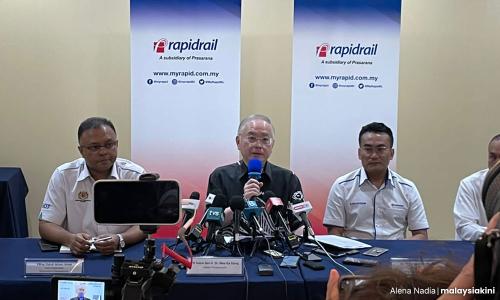LETTER | LRT, KVDT2 and ECRL fiascos have made Wee unelectable
LETTER | LRT breakdown is still fresh in our minds. For nine days, the services were not running, much to the inconvenience (and anger) of the commuting public.
The alternative transport was poorly organised and did not measure up to the needs of the stranded passengers. There was never an emergency plan prepared in the first place.
Experts from Canada and Turkey had to be brought in to rectify the problems. But there is no guarantee that this 24-year-old LRT will not break down again.
It seems like there is a dearth of talent in this field locally and that Malaysian expertise was never developed for the process of maintenance and fault rectification.
Since the government-owned LRT and other forms of public transport infrastructure, like MRT and KTM, the fault, therefore, falls squarely on the government.
KVDT2
Prior to the LRT fiasco, commuters in Klang Valley were faced with continuous traffic congestion, partly because KTM commuter services, which carried about 140,000 commuters daily, were not running at full capacity.
Understandably, the ongoing upgrading and rehabilitation of the double tracks between Port Klang - KL Sentral – Seremban (Klang Valley Double Tracking - Phase 2) was still ongoing. Thus, daily passenger volume dwindled to only about 30,000.
But when Wee Ka Siong became the transport minister in March 2020, he cancelled the KVDT2 contract. The contractor took the government to court and all the works were stopped until June 2022, when a court settlement was reached between the Attorney-General’s Chambers and the contractor.
This was the date when the government decided to rescind their objection and contract cancellation through the court.
The contractor then withdrew their case and was subsequently re-appointed. The government had no choice but to continue with the contract, at the same value, plus compensation.
The whole drama was totally unnecessary. The delay (created by the minister) and his mishandling of the episode, clearly point towards his limited level of competency and his inability to manage the public transport functions in meeting the passenger demand and supply.
The lull contract period (between March 2020 and June 2022) meant that the rail capacity and services continued to be drastically reduced and commuters were forced to seek alternative means of transport.
They had no choice but to go back to road transport, adding more traffic onto the already congested roads within Klang Valley.
From the commuting public viewpoint, this fiasco was not desirable and the hidden cost to the government was more than it originally budgeted.
ECRL and NCORE
Speaking of public funds, the same minister also decided that the alignment for an agreed ECRL line via Southern Selangor (resolved by the previous government in 2019) be changed to Northern Selangor.
He mooted this new alignment to go via Bentong, Rawang, Kapar and Port Klang (all the seats his coalition lost in the 2018 general election).
This revised new alignment is costing the government an additional RM10 billion to the total project.
In view of the many railway projects being built in the country, the previous transport minister registered the National Centre of Rail Excellence (NCORE) under his ministry, in 2019.
The vision then was to enable the rail Industry to be a strong and sustainable sector, capable of satisfying the demands of national rail transportation.
It was also an objective of the ministry to make the rail-based sector as a competitive global player that will optimise the use of indigenous resources and technologies.
However, the current minister has paid scant regard to this initiative. KVDT2 is not even listed as a project on the ministry’s website.
LRT and MRT projects are not mentioned at all, let alone on the objective to develop local expertise and technological know-how as supporting areas of competency in the rail sector.
There is no clear direction put forward or advocated by the current minister. The rail sector is crying for support, technically and financially. But the minister isn’t listening.
How is Malaysia going to be made sustainable when major contracts are awarded to foreign companies?
ECRL, for instance, despite costing more than RM50 billion, has no place for locals to be trained and gain any experience.
KTMB’s big contracts are mostly undertaken by foreigners, too.
There is no need to repeat the large-scale contracts involving LRT, MRT and Rapid Transit System (RTS) in Johor.
For all his scores mentioned, it is now down to the voters in Ayer Hitam, to stamp their rejection this Saturday. For many Malaysians, Wee is a clear-cut case of an unelectable candidate.
The views expressed here are those of the author/contributor and do not necessarily represent the views of Malaysiakini.
RM12.50 / month
- Unlimited access to award-winning journalism
- Comment and share your opinions on all our articles
- Gift interesting stories to your friends
- Tax deductable
